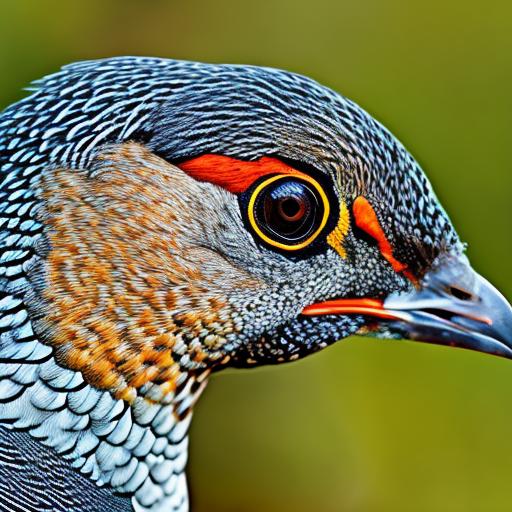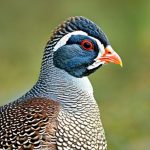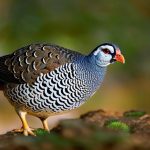Guinea fowl, also known as pintades, are a type of game bird native to Africa. They are closely related to domesticated chickens and are often kept for their meat and eggs. Guinea fowl are known for their distinctive appearance, with speckled feathers and a helmet-like crest on their heads. They are also known for their loud, distinctive call, which can be heard from a distance. Guinea fowl are hardy birds that are well-suited to a variety of climates and are relatively low-maintenance, making them a popular choice for small-scale poultry farmers and homesteaders.
Guinea fowl are social birds that prefer to live in flocks, and they are known for their strong flocking instincts. They are also excellent foragers and will spend much of their time scratching and pecking for insects, seeds, and other small creatures. Guinea fowl are also known for their keen sense of alertness and will sound the alarm if they sense danger, making them excellent “watchdogs” for other poultry or livestock. Overall, guinea fowl are a unique and valuable addition to any small farm or homestead.
Key Takeaways
- Guinea fowl are hardy, low-maintenance birds that are known for their pest control abilities and flavorful meat.
- When housing guinea fowl, it’s important to provide a secure enclosure with plenty of space for them to roam and roost.
- Guinea fowl have specific dietary needs and require a balanced diet of grains, greens, and insects to thrive.
- Regular health checks and preventative measures are essential for keeping guinea fowl healthy and disease-free.
- Breeding guinea fowl requires careful monitoring of mating behavior and providing suitable nesting areas for hens.
Housing and Enclosure
When it comes to housing guinea fowl, it’s important to provide them with a secure and comfortable environment. Guinea fowl are relatively hardy birds, but they still require protection from predators and the elements. A well-constructed coop or shelter is essential for keeping guinea fowl safe and healthy. The coop should be spacious enough to accommodate the size of the flock, with at least 3-4 square feet of space per bird. It should also be well-ventilated to prevent the buildup of moisture and ammonia from their droppings.
In addition to a coop, guinea fowl also require access to an outdoor enclosure or run. This area should be securely fenced to prevent predators from gaining access and should provide plenty of space for the birds to roam and forage. Guinea fowl are active birds that enjoy exploring their surroundings, so providing them with ample space to do so is important for their well-being. It’s also important to provide plenty of roosting space in the coop, as guinea fowl prefer to sleep off the ground to avoid potential predators. Overall, providing a safe and comfortable housing and enclosure for guinea fowl is essential for their health and happiness.
Feeding and Nutrition
Guinea fowl are omnivorous birds that have a varied diet consisting of seeds, insects, small rodents, and plants. In a domestic setting, it’s important to provide guinea fowl with a balanced diet that meets all of their nutritional needs. A good quality commercial poultry feed can form the basis of their diet, supplemented with fresh fruits and vegetables, as well as access to pasture or forage. It’s important to provide guinea fowl with access to grit, which helps them digest their food, as well as clean, fresh water at all times.
In addition to their basic dietary needs, guinea fowl also require additional nutrients such as calcium for egg production and growth. Providing access to crushed oyster shells or another source of calcium is essential for laying hens. It’s also important to monitor the condition of the birds and adjust their diet as needed to ensure they are maintaining a healthy weight and condition. Overall, providing guinea fowl with a balanced and nutritious diet is essential for their health and productivity.
Health and Care
Guinea fowl are generally hardy birds that are relatively resistant to many common poultry diseases. However, they still require regular care and attention to ensure they remain healthy. Regular health checks should be conducted to monitor the condition of the birds and identify any potential issues early on. It’s also important to provide guinea fowl with a clean and dry living environment to prevent the buildup of bacteria and parasites.
In addition to regular health checks, it’s important to provide guinea fowl with access to dust baths, which help them keep their feathers clean and free from parasites. Providing regular access to dust baths can help prevent issues such as mites and lice, which can be problematic for guinea fowl. It’s also important to provide regular parasite control measures, such as treating the birds with poultry dust or other appropriate treatments as needed. Overall, providing regular care and attention to the health of guinea fowl is essential for keeping them healthy and productive.
Breeding and Reproduction
Breeding guinea fowl can be a rewarding experience for poultry enthusiasts. Guinea fowl are seasonal layers, typically laying eggs in the spring and summer months. They are also known for their strong brooding instincts and will often go broody and hatch their own eggs if given the opportunity. However, if you’re looking to breed guinea fowl, it’s important to provide them with a suitable nesting area where they can lay and incubate their eggs in peace.
Guinea fowl eggs take around 26-28 days to hatch, and the chicks are relatively independent from a young age. However, it’s still important to provide them with a warm and secure environment in which to grow and develop. Providing brooding hens with a quiet and secure area where they can raise their chicks is essential for their well-being. It’s also important to provide the chicks with access to a high-quality chick starter feed and clean water from a young age. Overall, breeding guinea fowl can be a rewarding experience, but it’s important to provide them with the right conditions for successful reproduction.
Predation and Protection

Guinea fowl are natural foragers that spend much of their time roaming and exploring their surroundings. However, this can also make them vulnerable to predators such as foxes, raccoons, hawks, and other animals. Providing guinea fowl with a secure enclosure is essential for protecting them from potential predators. This can include using sturdy fencing, secure coops, and even adding guard animals such as dogs or geese to help deter potential threats.
It’s also important to provide guinea fowl with access to plenty of hiding places within their enclosure where they can seek shelter if they sense danger. This can include providing dense vegetation or brush piles where they can hide from potential threats. Providing guinea fowl with a safe and secure environment is essential for protecting them from potential predators and ensuring their well-being.
Benefits of Keeping Guinea Fowl
There are many benefits to keeping guinea fowl on a small farm or homestead. Guinea fowl are excellent foragers that can help control insect populations in the area, making them a valuable addition to any pest management plan. They are also known for their keen sense of alertness and will sound the alarm if they sense danger, making them excellent “watchdogs” for other poultry or livestock.
In addition to their pest control abilities, guinea fowl also provide a source of meat and eggs for small-scale farmers. Guinea fowl meat is lean and flavorful, making it a popular choice for many culinary dishes. Their eggs are also prized for their rich flavor and nutritional value. Overall, keeping guinea fowl can provide a variety of benefits for small-scale farmers and homesteaders alike.
In conclusion, guinea fowl are unique and valuable birds that can make a great addition to any small farm or homestead. With the right care and attention, guinea fowl can thrive in a variety of environments and provide a range of benefits for their owners. Whether you’re looking for natural pest control, a source of meat and eggs, or simply enjoy the company of these fascinating birds, guinea fowl are an excellent choice for poultry enthusiasts. By providing them with a secure housing and enclosure, a balanced diet, regular health care, and protection from predators, you can ensure that your guinea fowl remain healthy and productive for years to come.
If you’re considering keeping guinea fowl at home, you may also be interested in learning about caring for goslings. Poultry Wizard has a helpful article on how to care for goslings, which provides valuable insights into raising and nurturing young geese. Understanding the care requirements for different types of poultry can help you create a comfortable and safe environment for all your feathered friends.
FAQs
What are guinea fowl?
Guinea fowl are a type of bird native to Africa. They are known for their distinctive spotted feathers and loud, chattering calls.
What do guinea fowl eat?
Guinea fowl are omnivores and eat a variety of foods including insects, seeds, grains, and small reptiles. They are also known to forage for food in the wild.
How do you keep guinea fowl at home?
To keep guinea fowl at home, you will need a secure coop or shelter to protect them from predators. They also require access to a large outdoor area for foraging and exercise.
Are guinea fowl noisy?
Yes, guinea fowl are known for their loud calls and can be quite noisy, especially when they feel threatened or are disturbed.
Do guinea fowl make good pets?
Guinea fowl can make interesting and entertaining pets, but they are not as domesticated as chickens and may be more challenging to handle and care for.
What are the benefits of keeping guinea fowl?
Guinea fowl are known for their pest control abilities, as they eat insects and can help keep a property free of ticks, flies, and other pests. They are also low-maintenance birds and can thrive in a variety of climates.
Meet Walter, the feathered-friend fanatic of Florida! Nestled in the sunshine state, Walter struts through life with his feathered companions, clucking his way to happiness. With a coop that’s fancier than a five-star hotel, he’s the Don Juan of the chicken world. When he’s not teaching his hens to do the cha-cha, you’ll find him in a heated debate with his prized rooster, Sir Clucks-a-Lot. Walter’s poultry passion is no yolk; he’s the sunny-side-up guy you never knew you needed in your flock of friends!







